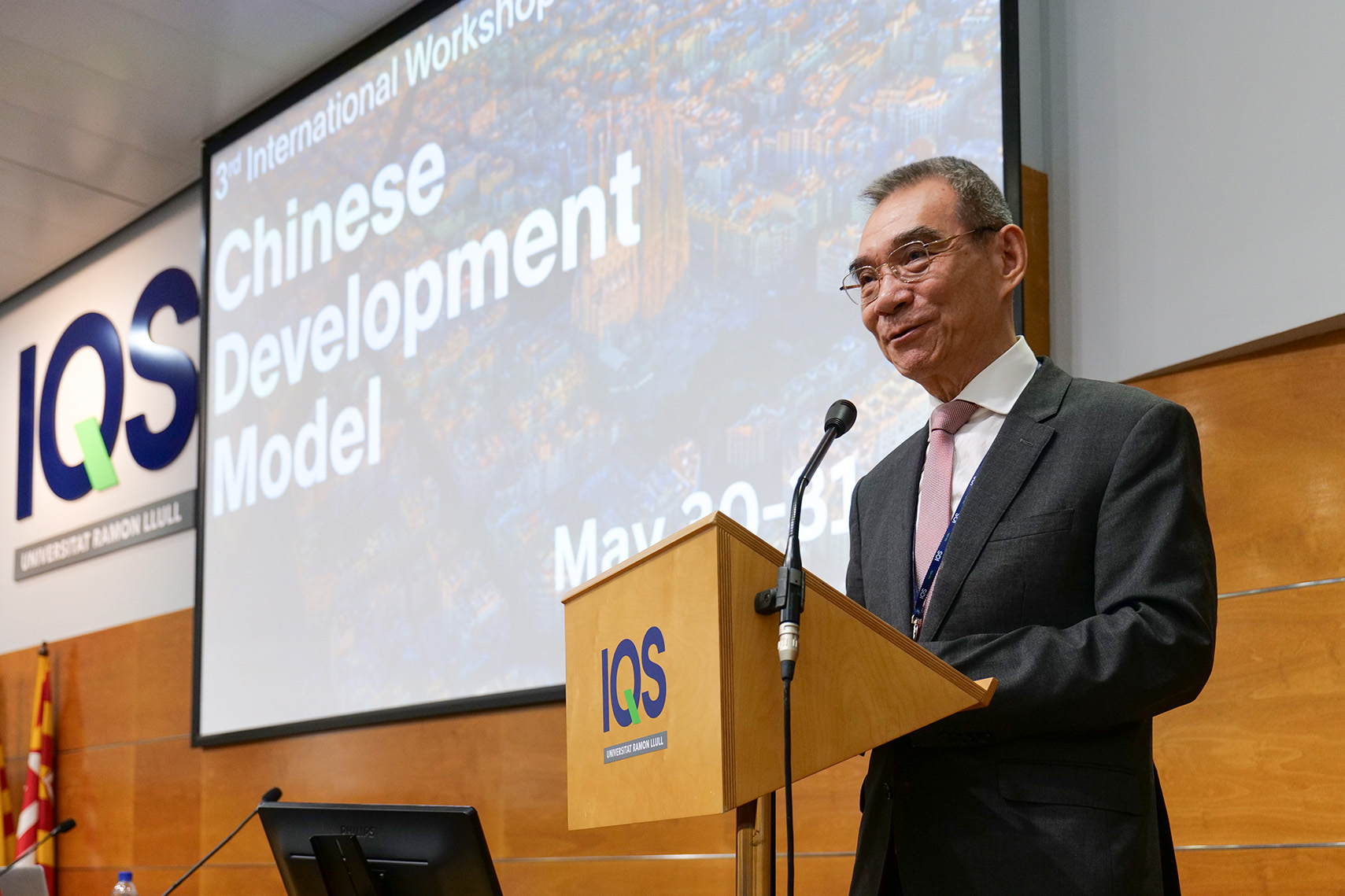The IQS School of Management recently organized the “3rd International Workshop on the Chinese Development Model” at the end of May, consolidating the school’s commitment launched two years ago to become an international reference in the field. The event was supported and sponsored by Casa Asia, the European Union (thanks to the PoPMeD-SuSDeV Project), the Confucius Institute of Barcelona, the Journal of Chinese Economics and Business Studies, and the Chinese Economic Association. In addition, the event featured attended by the Acting Consul General of China, Hu Aimin, and the Vice Consul, Bao Shengxiang.
The event began with an opening lecture by Justin Yifu Lin, Dean of the Institute of New Structural Economics, Dean of the Institute of South-South Cooperation and Development, and Professor and Honorary Dean of the National School of Development at Peking University and former Chief Economist at the World Bank from 2008-2012. Currently, he is also a state councilor for China.
The workshop included eight parallel sessions, grouped into various topics related to development and the Chinese economy, in which 21 presentations were selected in advance by the organizing Scientific Committee.
Under the overall title “Aging and Demographic Changes,” the first session featured presentations of three papers: “China’s ‘Later, Longer, Fewer’ Campaign and Intergenerational Support of Elderly Parents,” by Cynthia Bansak, Charles A. Dana Professor of Economics at St. Lawrence University. She has been an economist on the Board of Governors of the Federal Reserve System, a co-editor of the Eastern Economic Journal, a member of IZA, a member of GLO, and a research member of CReAM. She is also Professor at the Chinese Center for Human Capital and Labor Market Research (CHLR), Central University of Finance and Economics (CUFE), Beijing, China.
The second paper was “The Effects of Social Pension on Agricultural Productivity: Evidence from China,” by Shouhan Dai (Zhejiang University). The third paper was “Ageing in a Dual Economy: Urban Ageing, Rural-Urban Migration, and Agricultural Development,” by Suqin Ge, director of Virginia Tech, Center for Future Places and Work Practices, co-editor of the China Economic Review, associate editor of the Journal of Labor Economics, and professor in the Department of Economics at Virginia Tech.
The second session, entitled “Environment and Sustainability,” included the papers: “Environmental Regulation and Firm Export: Evidence from China,” by Wenchao Bu (University of Glasgow), “Grassland Certification, Grazing Behavior, and Ecological Consequences: Evidence from Pastoral China,” by Bingyu Huangfu (Zhejiang University), and “Sustainable Living Across Continents: Examining Recycling and Reusing Practices in China vs. the United States,” by Lily C. Dong (University of Alaska Fairbanks).
“MSCA Staff Exchanges in a nutshell” was the theme of the third session, led by Raquel Jiménez Frías (European Research Executive Agency). With a career spanning more than 23 years, she is a project advisor for the Marie Skłodowska-Curie staff exchange actions at the European Research Executive Agency, a position she has held for nine years. She previously worked at the European Commission managing cooperation programs (environment, energy, and transport). She has also participated in the evaluation of investment and research projects in Spain.
The fourth session was entitled “Geopolitics,” and included “Competitiveness of the Chinese Economy following the Dual Circulation Strategy,” by Krzysztof Falkowski (SGH Warsaw School of Economics), “China’s food security, self-sufficiency, and trade under geopolitical tensions,” by Qingbin Wang (University of Vermont), and “The impact of perceptual congruence about organizational identity on subsidiary innovation capability: empirical evidence of Chinese multinational firms and their overseas subsidiaries,” by Jun Li (Sun Yat-sen University).
“Monetary Dynamics” was the title of the fifth session, which presented “Macro news, information environment, and the RMB exchange rates,” by Zhitao Lin (Jinan University) and “Quantifying the Natural Rate of Real Interest for China’s Monetary Policy,” by Lixin Sun (Shandong University).
The sixth and final session on the first day was entitled “Green Finance and Corporate Responsibility.” It included the presentations “ESG Dynamics in Chinese Family Firms: The Role of Socio-Emotional Wealth and Institutional Holdings,” by ChangYi Zhu (Autonomous University of Barcelona), “The Impact of Financial and Tax Incentives on Corporate Green Investments Based on the Empirical Evidence of China A-Shares,” by Tat Chee TSUI (United International College), and “Between political legitimacy and strategic competitiveness: overseas corporate social responsibility patterns of Chinese international contractors,” by Yue Lin (Autonomous University of Madrid).
The Palau Macaya (now the Caixaforum Macaya) was the venue that hosted the second day of lectures. “The place itself made the day memorable and we ended the workshop with lunch on a terrace overlooking the Sagrada Familia,” the organization explains.
The second day of the event began with a roundtable featuring the speakers Justin Yifu Lin and Dr. Martina Bofulin. It was followed by the session “Migration,” which included “Brain Gain through Return Migration,” by Allan Zebedee (Clarkson University), “Consumption composition of internal migrants in China,” by Yi Wang (Politecnico di Milano), and “Relaxing Migration Restrictions and Labor Reallocation,” by Peinan Hu (Zhejiang University).
The workshop ended with the session “Regional Development,” which included “Determinants and dynamics of the accessibility of public service for migrant populations based on cross-regional collaboration policy under the strategy of new type urbanization – an empirical research on basic health insurance policy from China,” by Guo Minjiang (Peking Union Medical College), “Factor market intervention, ‘Scissors gap’ of Land Prices and High-quality development in Chinese counties – Empirical evidence from the policy shock of the new round of county-to-city upgrading,” by Hongjun Zhao (Shanghai Normal University), and “The Policy oriented Private Economy: Evidence from the Revitalization of Northeast China,” by YE Zinan (City University of Hong Kong).










